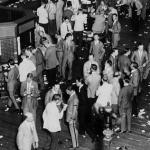In his forthcoming The Left Behind, Princeton sociologist Robert Wuthnow tries to penetrate past the headlines and stereotypes to discover the truth about, his subtitle has it, decline and rage in rural America.
Wuthnow didn’t drop into flyover country for a long weekend of hanging with local pundits at a bar. His study is based on extensive in-depth interviews with Americans in dozens of rural communities. A product of rural America himself, he wants to understand what drives and threatens rural life in today’s America.
Most of the towns in the US are rural towns, as measured by population: “Of the 19,000 incorporated places in the US, 18.000 have populations less than 25,000. Of these, 14,000 are located outside an urbanised area” (5).
That statistical decline is part of the story of rural life. Wuthnow posits that rural communities are “moral communities,” that is to say, places where people feel obligation to one another and “to uphold the local ways of being that govern their expectations about ordinary life and support their feelings of being at home and doing the right things” (4). Rural Americans aren’t really individualistic. They’re “community-oriented.”
He recognizes that rural communities aren’t all the same, but thinks there are commonalities. Rural Americans stay in small towns because they feel save, value the relative simplicity of life, take pride in their community’s achievements (e.g., high school football). An unwritten code governs communities life: Avoid being a burden and pitch in when you’re needed. Churches are often central to the community services a small community provides (7-8).
And their communities, and the moral assumptions that guide life in small communities, aren’t holding up. If small towns dominate in terms of towns, they have a sharply declining share of the American population. Between 1810 and 2010, he says, the rural population declined from 95% to 20% of the population (45). As population declines, schools close, businesses leave, jobs disappear.
Wuthow describes the moral outrage of small towns as “a mixture of fear and anger. The fear is that small-town ways of life are disappearing. The anger is that they are under siege. The outrage cannot be understood apart from the loyalties that rural Americans feel toward their communities. It stems from the fact that the social expectations, relationships, and obligations that constitute the moral communities they take for granted and in which they live are year by year being fundamentally fractured” (5).
Their anger at the federal government comes form multiple sources. The rules for getting help from outside the community have changed. Getting money from state or federal agencies is a laborious, complicated process, and doesn’t always help. Distant bureaucrats aren’t responsive to the needs of small towns (9).
Wuthnow doesn’t think that small towns are overtly racist. Yet, because 85-90% of the rural population is white, the assumed moral order is premised on whiteness. Diversity isn’t valued; it has the potential to create confusion and fissures in the moral community of a small town. Wuthnow concludes, “racism and misogyny are built into the patterns of life that nearly all-white communities have come to accept. And a part of their anger is assuredly the view that the promotion of diversity is a further intrusion of big government” (10-11).
Besides the sheer economic facts, small communities feel they are under moral siege from morally liberal America. But the anger is often self-directed as well as directed at elites. Teen pregnancy rates are higher in rural areas than in urban (63). The people Wuthnow interviewed often blame television and the internet for promiscuity, but they also blame themselves for now protecting their communities better. The same dynamic is evident in other areas, such as the drug epidemic in small town America.
In short, the rage is directed at threats to “moral fabric”: “the shared notion that what the community represents is right” (78). It arises partly from shame: If the community is in trouble, reflects on the members of the community.












